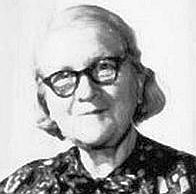Rózsa Péter
He was a teacher at the Budapest Jewish Community High School from 1928.
Encouraged by his classmate and lifelong friend László Kalmár, he worked on recursion theory, including the theory of primitive recursive functions. In 1932, his presentation at the International Mathematical Congress in Zurich led to the worldwide acceptance of the study of recursive functions as a separate branch of mathematics. In 1935, he received his doctoral degree with his dissertation on the study of recursive functions.
In 1939, he was dismissed because of his Jewish origin and then imprisoned in a ghetto. Here - influenced by his correspondence with literary historian Benedek Marcell about differential calculus - he wrote his book "Game with the Infinite", which brings the world of ideas and discoveries of mathematics closer to outsiders (the book was published by Dante Publishing in 1944, but was only distributed in 1945 after the end of the war). The book was a huge success in 1945; it was translated into 12 languages; it went through several new editions in Hungarian and English.
He was appointed as a teacher in 1945 and, in the curriculum development committee of the Public Education Council, he prepared the new-style mathematics curriculum for various types of schools. He judged textbook competitions and curricula, wrote textbooks, and gave lectures. When the Budapest Pedagogical College was established in 1947, he was the organizer and head of the Department of Mathematics – until the College was closed down in 1955.
From 1950 he was a private tutor at Eötvös Loránd University (ELTE), and from 1955 until his retirement in 1975 he was a professor at ELTE; he was a lecturer in the subject "Fundamentals of Mathematics". He introduced the teaching of Set Theory and Logic at ELTE. As the head of the mathematics supervisors' group of the University's Teacher Training Council, he actively participated in the education of teacher candidates and the selection of leading teachers of the training schools. His teaching method was the discovery of the beauty of mathematics by the students. He wrote numerous college and university textbooks.
In 1951, he was the first in the international mathematical literature to publish his monograph Recursive Funktionen (which was also translated into Russian, Chinese and English). Later, he discovered the wide range of possibilities for generalizing recursive functions and for their practical application, e.g. in the fields of (computer) programming theory, mathematical linguistics, translation between formalized languages and logical optimization; his results in this direction were presented in his second monograph, “Rekursive Funktionen in der Komuter Theorie”, published in 1976, which was also published in English after his death in 1981.
He was a member of the editorial board of the American journal The Journal of Symbolic Logic, founded in 1937. He was the honorary president of the Bolyai János Mathematical Society (BJMT) until his death. From 1973, he actively directed the Society's ideas on secondary school mathematics teaching.
In 1952, she became the first Hungarian female mathematician to receive a doctorate from the Hungarian Academy of Sciences, and was elected a corresponding member of the Hungarian Academy of Sciences from 1973. From 1973, she became a member of the Mathematics Subcommittee of the Hungarian Academy of Sciences' Presidium's Public Education Committee.
His awards: Kossuth Prize (1951); Beke Manó Memorial Prize (BJMT, 1953); the Gold Class of the Order of Merit for Labor (1967); the State Prize, 1st Class (1970); the Award of the Association of Technical and Natural Science Associations (MTESZ) (1974); the Second Class of the Order of the Banner of the Hungarian People's Republic (1975).
- Wikipedia
- career plan
- Rózsa Péter, the “grandmother” of mathematics
- Imre Ruzsa, János Urbán: In memory of Péter Rózsa (obituary with publication list, in: Matematikai Lapok 26. vol. 1977. no. 1-2. p. 125-137. )
- notable publications
- Wikiquote
- 12 quotes from Péter Rózsa (citatum.hu)
- "Hungarian Women - Péter Rózsa" - a portrait film about her life and work (in the National Audiovisual Archive)
- “I love mathematics not only because it can be applied in technology, but mainly because it is beautiful. Because man has also brought a playful spirit into it, and it is capable of the greatest game: it can make infinity tangible.” (Quote from the preface to the book Playing with Infinity.)
- He was one of those exceptional individuals who were equally outstanding as a researcher, teacher, and book writer.
- He regularly wrote film reviews and enjoyed translating poetry in his free time. Overall, it can be said that the unity of human and scientific culture was realized in his personality.
- In his final years, his main focus was on changing and improving high school mathematics education. He believed that this was the most important thing because it was the foundation of all mathematical life.
Created: 2018.01.31. 20:47
Last modified: 2024.06.25. 10:45

